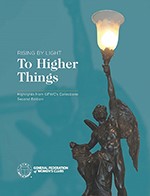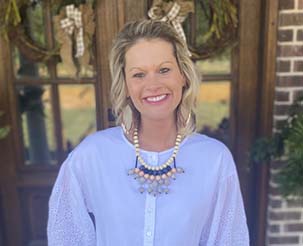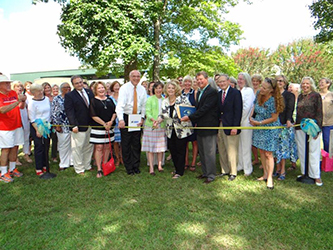Suffrage at 100
Over the next six months, News & Notes will feature a monthly column which explores suffrage and the 100th anniversary of the 19th Amendment.
The 19th Amendment was ratified on August 26, 1920, and prohibits state and federal governments from denying citizens the right to vote on the basis of their sex. The motion for women’s suffrage was first submitted to congress in 1878, but its ratification was the culmination of 72 years of formal organizing and the work of thousands of activists.
The groundwork for the suffrage movement was laid in 1848, when women and men led by Elizabeth Cady Stanton, Susan B. Anthony, and Lucretia Mott met in Seneca Falls. As suffrage grew in popularity, proponents of the movement were not always united and it produced leaders of differing backgrounds and opinions. Although the National Women’s Suffrage Association and the American Women Suffrage Association both worked towards the same goal, issues of race and tactical approach separated them.
In 1890, the two groups united to capitalize on a new surge in support for suffrage. Although the majority of American women had previously been apathetic, the popularity of women’s volunteer organizations forged new roles for women and helped to legitimize the previously unpopular suffrage movement.
The National Women’s Party, led by Alice Paul, began picketing in 1913 and holding marches and mass rallies to gather support. These actions, and the subsequent imprisonment of suffragists, helped to buoy public empathy and support for the women. The public pressure eventually led to support from President Woodrow Wilson. The Amendment was finally supported by Congress in June 1919 and was officially ratified in August 1920.
Although the passage of the 19th Amendment granted 26 million women the right to vote, those protections did not extend to African American, Asian American, Hispanic American, or Native American women, among other minority groups. All Americans would not be fully enfranchised until 1965 when the Voting Rights Act was passed—another historic milestone.
Please kick of your own observation efforts by registering for the 2020 Women’s History Month Event on March 5, from 2–4 p.m. This year’s event will feature Kate Campbell Stevenson. Kate’s one-woman show, Amending America: How Women Won the Vote!
Cares & Concerns
It is with great sadness that GFWC announces the passing of Community Service Program Chairman, Phyllis Skubic’s (2018– 2020) father, Raymond Bottens. Please mail all cards to Phyllis Skubic at 40 W Gordon St. ,Coal City, Illinois 60416. For more information and to leave a tribute, view Raymond’s obituary.
GFWC also regrets to inform you of the passing of Nevada Past State President (1986–1988) and Past Western States Region President (2000–2002), Colleen Haycock. Please mail all cards to Marie Christensen at 1685 Bonita Bay Dr. ,St. George, UT 84790. For more information, view Colleen’s obituary.
Volunteers in Action
MLK Day of Service was a huge success! Clubs and State Federations all over have truly made this MLK Day a “day on” and not a day off. Read this week’s GFWC Blog and comment on the great projects that our GFWC Clubs have participated in.
Have a success story to tell? Email pr@gfwc.org.
February 1: Success for Survivors Scholarship Deadline
The call for 2020 GFWC’s Success for Survivors Scholarship applications closes next Friday, February 7. You still have one week to help GFWC spread the word and reach survivors who may be interested in applying for the 2020 Success for Survivors Scholarship. This scholarship provides survivors of intimate partner violence with financial support as they seek higher education.
As part of the GFWC Signature Program: Domestic Violence Awareness and Prevention, the GFWC Success for Survivors Scholarship was created in 2012 to lend a helping hand to those impacted by intimate partner violence who are pursuing higher education. The scholarship aims to provide survivors with a means to achieve both financial and personal independence. Since its inception, GFWC has awarded over $60,000 in scholarship funds.
This essential scholarship is only made possible through generous donations. Take it a step further and partner with an alumnae organization from a local college or university to create the “Go Forward With Confidence” Scholarship, or GFWC Scholarship for short. It’s an opportunity to expand the Success for Survivors Scholarship, increase its visibility, and help students in your community.
Spread the word and help a survivor fund their education by applying today! Start giving survivors a better tomorrow by fundraising for the GFWC Signature Project Fund today.
Having Trouble Logging In?
GFWC recently had a server change in MemberSuite and, since that change, some members have had issues when logging in. If you are having trouble, try these three steps:
1. Select “Forgot your password?”: enter the email address with which you are receiving this News & Notes.
2. Clear browsing data: Go to your browser setting and select “History.” After selecting “History” click the option to “Clear all History” and complete the instructed steps.
3. Enable Cookies: Go to your browser settings and click “Advanced” settings option. Under “Privacy and security” click Site settings. Click “Cookies” and enable them.
If your still have trouble logging in, contact GFWC at gfwc@gfwc.org or call 202-347-3168.
Participate: Community Improvement Program Contest
by GFWC Community Improvement Awards Chairman Kathy Canzano
Want your club’s efforts to be rewarded for its service work? By completing your award entry and submitting it to your State Chairman, you could be the winner of State Awards and National Awards! GFWC distributes $18,860 back into winners’ local communities.
Winning might seem impossible at first, but it’s not. Just make a compelling case to the judges by convincing them that you have an outstanding service project!
Now is the time to complete and submit your Community Improvement Program (CIP) Award entry. Projects must have been accomplished during the program period: January 1, 2018–December 31, 2019. Club entries must be sent to your State CIP Award Chairman, postmarked no later than March 1, 2020. All entries must include a current, completed CIP Contest entry form found under GFWC Resources, or by accessing “My Digital Library” after logging into the Member Portal. Project notebooks containing narrative descriptions and supporting materials must not exceed seven pounds nor measure more than 15″x 20.” Follow the judging criteria to receive the maximum points:
Project Selection = 25 Points
What community issues were considered in the project selection phase and how were the needs were addressed? What procedures and plan of action was used in choosing the project?
Project Development = 50 Points
Did you involve partners, other community organizations, and/or government agencies in your project? Including the plan details, execution, and efforts, as well as photos, letters, project plans, and news clippings. Did you encounter obstacles and how did you address those challenges?
Self-Evaluation = 25 Points
What are the specifics of your project’s achievements, including criteria used to measure success, awareness, and future plans? Was there a long-term impact on your community?
These awards are here for you, but you have to enter to win. Will it be your club?
Curator’s Corner
When journalist Jane Cunningham Croly founded Sorosis in 1868, she established it as a literary club for like-minded women. Croly was a strong advocate for women’s education and sought to carve out an intellectual space where women could read, write, and discuss ideas with each other. These literary seeds, which are rooted in the earliest days of GFWC, can be found planted throughout our history.
In 1890, when GFWC officially federated, the Literary Committee was one of the first committees to form. By the 1920s, GFWC’s Department of Fine Arts had branched out to develop a separate Committee on Poetry. The Committee regularly produced pamphlets which specified new poets and publications and “a course of study and program-building adapted to the individual needs of clubs which wish to devote either regular or occasional days to the study of poetry.”
Along with studying the recommended bibliography produced by GFWC, State Federations would also name Poet Laureates to represent their own regional style of poetry. Books from these poets, as well as poems published by clubwomen across the country, comprise GFWC’s State Poetry Collection.
Over the coming months, the WHRC will be digitizing the State Poetry Collection. These books, which were published in the early twentieth century and are primarily out of print, also make up a piece of the WHRC Rare Book Collection. View the State Poetry Collection.
State Director’s Project: Massachusetts, Jennifer Nowak
In Massachusetts, Director of Junior Clubs Jen Nowak made veterans her focus area, knowing that clubs across Massachusetts always include veterans in their club projects. She asked clubs to “kick it up a notch” this administration, continue what clubs have done, and focus on at least one project directly impacting female veterans. Clubs have hosted ice cream socials at two veteran shelters, made cards to thank them for their service, provided new socks, and more. One club held a fundraiser to support Wild Heart Horses for Heroes, an equestrian program designed for veterans with post-traumatic stress disorder. Project New Hope was discovered and has a baby pantry, where veteran families can come in once a month for baby supplies at no charge. Diapers and wipes are in constant need and are collected at the Massachusetts Annual Conference. A sedan was surprisingly overflowing with these generous donations.
The Director asked clubs to support Wreaths Across America (WAA), which placed the wreaths currently on the headstones of our fallen heroes in December. This program has very special meaning to this Director, who has had the opportunity to attend Wreaths Across America Day in Arlington National Cemetery three times. The WAA program has over the years extended its ceremonies to many local cemeteries. In 2017, Island Pond Cemetery in Ludlow Massachusetts was included; this is the cemetery where her Dad is resting. A new family tradition was started that year, bringing many of her extended family members together.
At the fall conference, Kelly Hinkle from Wreaths Across America came to speak and show a video recap of how WAA was formed and the path this nonprofit has followed to achieve its accomplishments of today. It was a proud moment for the Director when a $2,000 check was presented for WAA.
Parliamentary Pointers
by GFWC Parliamentarian Deen J. Meloro
In order to run a smooth meeting, there are certain resources you need to have with you. It is up to your club to decide who should bring each of these to a meeting.
Agenda
This is written by the President, sometimes with the help of the Recording Secretary. The Recording Secretary should be able to remind the President of any unfinished business or any business the Bylaws say must be brought up at a particular meeting. The President needs to know which officers and chairmen will be reporting so that those are the only ones she calls on. Once written, a copy of the agenda should go to the Recording Secretary and the highest-ranking Vice President, at the very least.
Minutes
Not only the minutes of the previous meeting should be available but the minutes going back at least six months. This will enable a search for a previous club decision or information needed such as the following.
1. A Complete Club Membership List
2. Club Bylaws and Standing Rules
3. State Bylaws and Standing Rules
4. Robert’s Rules of Order, Newly Revised, 11th Edition
5. Club Yearbook
6. Gavel
7. A small American Flag: This is needed if the meeting place does not have a flag.
8. A Microphone (if needed)
9. A Podium (if possible)
10. Copies of information from your state and GFWC to share with members.
11. A watch or small clock. If the meeting place does not have a clock on the wall, the President should have a watch or a small clock facing her in order to be aware of how long things are taking.
Marketplace: WHRC Collections Book

The WHRC Collections Book is the perfect coffee table book to start a conversation anytime someone visits! Detailing over a century’s worth of the organization’s history, it’s a simple recruitment tool that will have your guests wanting to be a part of that history. Get your copy for $15 in the GFWC Marketplace.









